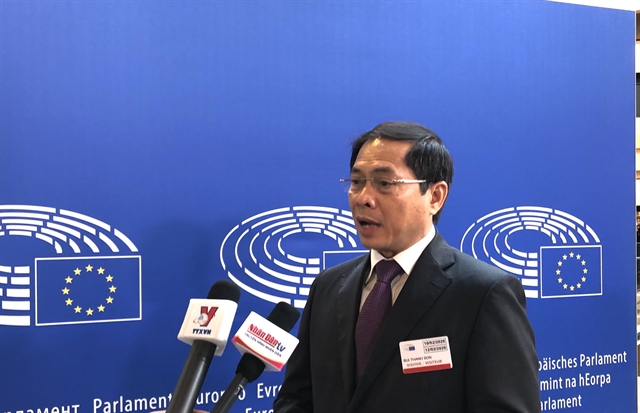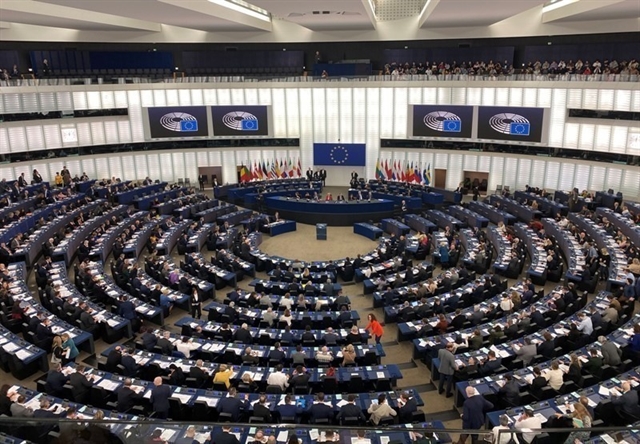 Economy
Economy

The European Parliament (EP) on Wednesday ratified the EU-Việt Nam Free Trade Agreement (EVFTA) and the EU-Việt Nam Investment Protection Agreement (EVIPA). Vietnam News Agency spoke to Deputy Minister of Foreign Affairs Bùi Thanh Sơn in Paris about the agreements.

|
| Deputy Minister of Foreign Affairs Bùi Thanh Sơn. — VNA/VNS Photo |
The European Parliament (EP) on Wednesday ratified the EU-Việt Nam Free Trade Agreement (EVFTA) and the EU-Việt Nam Investment Protection Agreement (EVIPA). Vietnam News Agency spoke to Deputy Minister of Foreign Affairs Bùi Thanh Sơn in Paris about the agreements.
Could you please comment on the significance of this decision?
The EP has just ratified very important strategic and economic decisions in Việt Nam and EU relations, opening a deeper, more comprehensive and effective cooperation between the two sides 30 years after they established diplomatic relations (1990-2020).
Signed on June 30, 2019 in Hà Nội, the EVFTA will take effect when it is ratified by Việt Nam’s National Assembly and the EP, while the EVIPA agreement should be approved by the National Assembly, EP and parliaments of EU member states. The EP's decision has given a "green light" to the implementation of the EVFTA and paves the way for parliaments of EU member states to consider and ratify the EVIPA.
First of all, the decision approving the EVFTA and EVIPA with a high rate of support shows the respect and appreciation of parliamentarians and EU member states to the role and position of Việt Nam, as well as to the Việt Nam – EU comprehensive cooperation partnership. The two agreements will create long-term bilateral cooperation frameworks in the direction of equality and mutual benefits, contributing to promoting international economic connection and sustainable development.
Secondly, the ratification of the agreements also confirms the EU's policy to continue strengthening ties with Asia-Pacific in general and ASEAN in particular. As Chairman of ASEAN 2020, we are ready to coordinate to further promote multi-faceted cooperation between the EU and ASEAN.
Thirdly, the EP's vote to approve the two agreements also shows the tremendous economic benefits that the EVFTA and EVIPA bring to both sides. The EVFTA will create opportunities for EU businesses to access the market of nearly 100 million people of Việt Nam, thereby gaining deeper access to ASEAN and regional markets. The EU’s GDP is expected to increase by US$30 billion and exports by 29 per cent by 2035.
For Việt Nam, the EU is the second largest market for exports. The implementation of the EVFTA is expected to increase the country’s GDP by 4.6 per cent and exports to the EU by nearly 42.7 per cent by 2025. Therefore, the EP's decision has received great applause from the community of businesses on both sides.
Fourthly, although the views among EP parliamentarians are different, the support for the EU's first high-quality FTA with a developing country shows the EU's determination to continue promoting trade liberalisation, trading and investment based on laws. The EP's decision will create more confidence and strengthen the trend of international economic integration and free and open trade. This is important in the context of increasing protectionism that threatens the growth of the world economy, many regions and countries.
We believe that the EVFTA and EVIPA will create a strong momentum for Việt Nam-EU relations, creating new milestones in Việt Nam’s socio-economic development and international integration process.

|
| Leaders of Việt Nam and the European Parliament at the conference to ratify the EU-Việt Nam Free Trade Agreement (EVFTA) and the EU-Việt Nam Investment Protection Agreement (EVIPA) in Strasbourg, France on Wednesday. — VNA/VNS Photo |
What are the difficulties for both sides in achieving this important result?
The EVFTA and EVIPA are the agreements with the deepest commitment of the EU to a developing country, so the approval process needs to follow strict regulations of the EP and national parliaments of EU member states. The approval must also ensure effective enforcement. In addition, with the increasing trend of protectionism, the fluctuations in internal politics of the EU, especially the Brexit process, the different views and interests within the EP, and the differences in development level also posed many challenges in the process of considering and ratifying the two agreements.
The voting results at the EP show that the majority of parliamentarians support the EVFTA and EVIPA, but there is also a part that has not expressed positive opinion. There are parties in the EP that are determined to pursue policies protecting domestic markets and not supporting FTAs, although they support the promotion of relations with Việt Nam and appreciate the increasingly important role of Việt Nam.
Many parliamentarians are particularly concerned with issues of sustainable development, combating illegal fishing, the enforcement of high labour standards, human rights, child labour and mechanisms to ensure effective implementation. Therefore, we have directly exchanged with them, providing them with information to help EU member states and more than 700 EP members understand the objective reality in Việt Nam, efforts to reform and integrate by Việt Nam, as well as coordination to solve issues of common concern promptly and effectively, which have been highly appreciated.
Two days before the voting on the EVFTA and EVIPA, the EP was also forced to conduct a vote on whether to postpone the voting for the two agreements due to the pressure and demands of several EP parties and committees.
It can be said that the EP’s majority of support is the result of the great efforts of the Government, the National Assembly and many related ministries, departments and branches. It is important that leaders at all levels of both Việt Nam and the EU have supported the signing and ratification of the two agreements.
In regular meetings and exchanges between the Party, State, Government, National Assembly, and leaders of many of our ministries, agencies and branches, with the leaders of the EP, EU member states and agencies, both sides are determined to promote the ratification of the EVFTA and EVIPA as soon as possible. Since then, the senior leaders of the two sides have closely instructed agencies to coordinate closely to accelerate this process.
As comprehensive and high-quality trade and investment agreements signed with a leading economic and trade partner, what will the EVFTA and EVIPA bring to the economy and Vietnamese businesses?
The EVFTA and EVIPA will create a new impetus to strongly promote and deepen economic-trade-investment relations between Việt Nam and the EU, commensurate with expectations and potentials of both sides.
With a deep and comprehensive level of commitment between the two economies, the EVFTA will bring great benefits to both sides. Once the EVFTA takes effect, the EU will eliminate import taxes on nearly 86 per cent of tariff lines from Việt Nam, which will be increased to 99 per cent after seven years. Meanwhile, Việt Nam will immediately remove 48.5 per cent of tariff lines for EU goods in the first year and increase to 91.8 per cent of tariff lines after seven years.
If we take advantage of the opportunities, Vietnamese businesses will have more competitive advantages in the EU market to increase exports significantly, especially in areas where we have strengths and enjoy preferential tariffs such as textiles, footwear, agricultural and aquatic products. In the context of complicated trade tensions among countries, the EVFTA will help our businesses promote the diversification of markets and partners, creating a firmer foothold in the EU market. Vietnamese people also have access to goods and equipment that Việt Nam has not been able to produce.
The EVFTA and EVIPA will also contribute to further promoting high quality investment flows from the EU, accompanied by advanced technology, leading management knowledge and new areas of digital economy.
In addition to economic commitments, the EVFTA also covers many new commitments on sustainable development, climate change adaptation, sustainable forest governance, high standards of labour and environment. The effective cooperation between the two sides in implementing these commitments will contribute to further promoting reform, sustainable growth, raising labour standards and the living standards of people.
In order for the EVFTA to be implemented soon, relevant agencies need to complete necessary procedures to submit to the National Assembly for consideration and ratification of the two agreements. We also need to actively promote parliaments of EU member states to ratify the EVIPA soon.
Ministries, departments, localities and businesses should urgently develop plans to implement the agreement and disseminate commitments and new regulations so that businesses can make good use of opportunities while responding to challenges that may arise when implementing the agreements. — VNS




